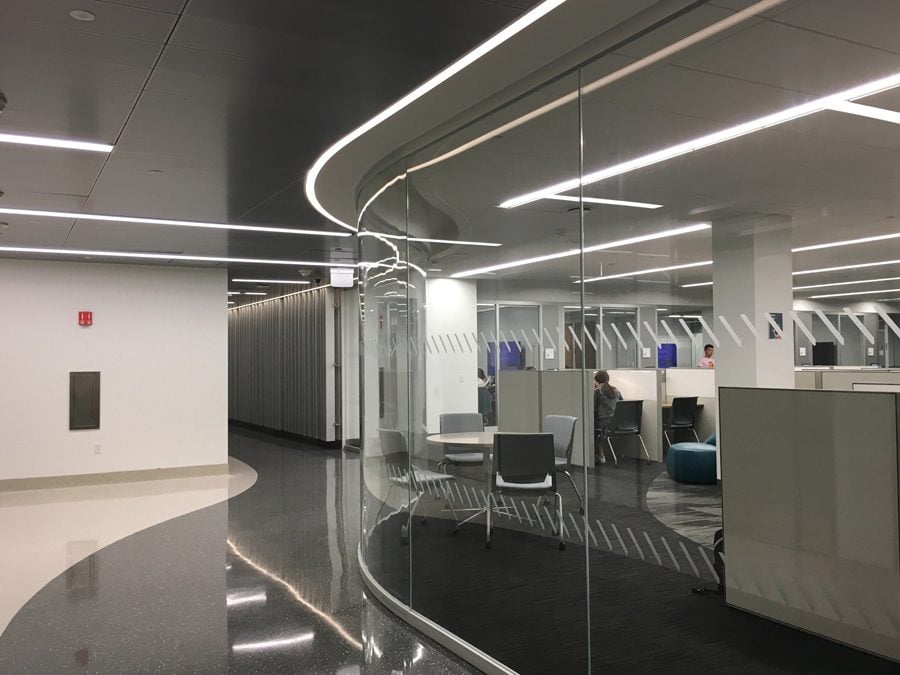Gun scare shines light on culture of productivity
Daily file photo by Colin Boyle
Mudd Library, 2233 Tech Drive. Weinberg sophomore Nicole Tanda joked that seeing students return to Mudd Library before the “all clear” message was the “most Northwestern thing possible.”
March 19, 2018
The alert first came to students via an emergency notification email: “This is not a drill. A person with a gun has been reported on the Evanston campus. If you are on the Evanston campus, seek shelter in a safe place and remain there until further notice.”
Heeding the warnings, students remained on lockdown for over an hour on Wednesday, fearing that they would join a growing group of people terrorized by active shooters in an American school.
“My heart rate skyrocketed,” said Lauren Stefenson. Familiar with the narrative of mass shootings, the McCormick sophomore said she thought it was “Northwestern’s time.”
Police later determined the call from a man claiming to have shot his girlfriend in Engelhart Hall was a hoax, but as many rattled students returned to their academic responsibilities, the episode laid bare tensions between Northwestern’s productivity culture, students’ mental wellbeing and the University’s push for a unique public image.
Weinberg sophomore Nicole Tanda said she was hiding in Cook Hall, texting friends to check their safety, when she received a 3:52 p.m. message from a biology professor — about 40 minutes before the “all clear” notification.
“As you know, the campus is currently on lockdown,” the message said. “If this situation is resolved, we will hold the main in-person version of quiz 12 at 7PM as planned.”
Although students always had the option to take the quiz online by the end of Wednesday, Tanda said she preferred to take the in-person quiz, as she performs worse online and objects to the requirement that students be recorded while taking the online version.
Tanda said the professor’s refusal to extend the deadline was “insensitive” because she had just spent two hours under a desk thinking her life was in danger.
“Overall, Northwestern, as exemplified by (the professor), just doesn’t really consider students’ mental health when they tend to make decisions,” she said. “I think that’s a problem; not just from professors, but a larger administrative problem.”
The professor did not immediately respond to a request for comment.
Students said the productivity culture on campus puts their mental health at risk.
“Everyone is constantly going above and beyond to do their best, be the most successful and trying their best at all time,” Medill senior Natalie Escobar said. “Doing your best means you’re always working all the time. Obviously that’s not a sustainable way to live.”
Tanda said people tend to prioritize their academics over their wellbeing. But while some students say they feel pressure to overextend, Northwestern has embraced students’ academic and extracurricular accomplishments.
In 2014, the University began a marketing campaign to highlight students’ “multidimensionality,” said Donna Biernadski, assistant vice president of global marketing. The “AND is in our DNA” campaign underlines students’ pursuit of interdisciplinary studies and numerous extracurricular activities, she said.
Some students have raised concerns about the campaign, saying it pushes them to overcommit, but Biernadski said the message shouldn’t be interpreted as pressuring students.
“We are very sensitive to the whole student atmosphere and how some of them feel pressured or overwhelmed,” she said. “We totally understand that students can take that upon themselves to feel that they have to then be doing all these things, but the messaging isn’t over-encouraging them to over-schedule themselves.”
Northwestern is “just wanting to be unique,” she added, adding that every university embraces a distinct specialty that attracts applicants.
Yet Escobar said the image “plays into the cultural norm” and makes her feel she should take on extra responsibilities.
“I only have time to be a journalism student and a human being,” she said. “I can’t be more than that.”
Biernadski said she hasn’t received any concerns from students about the advertising.
Dean of Students Todd Adams did not respond to requests for comment. Provost Jonathan Holloway wrote in an email to The Daily that the administration is “starting a thorough examination of our own processes, hoping to determine what we did well and what still needs work.”
“This gun scare felt very real to many people,” he wrote. “I completely sympathize and am concerned about a general sense of anxiety in our community. I wish I knew how to ease the campus’s concerns.”
That sentiment, however, wasn’t demonstrated across the whole campus.
Five graduate students in a Medill class told The Daily on Wednesday that their professor continued a final exam after the lockdown was lifted at about 3:52 p.m., but before it had been determined a hoax at about 4:34 p.m.
The students, who requested to remain anonymous, said though they had the option to take the test Thursday, many had to take it Wednesday due to travel plans. Students were visibly upset and crying during the exam, the students said, and were unable to respond to friends and family who were trying to contact them. Additionally, the students said they were still receiving updates from NU regarding the situation but were unable to check their phones.
Several of the students said they emailed Medill School of Journalism, Media, Integrated Marketing Communications administrators to express their concerns.
Escobar said she stopped doing schoolwork that day because none of her assignments were immediately due. Some students, however, continued with work that was due hours after the lockdown was lifted. Tanda joked that seeing students return to Mudd Library before the “all clear” message was the “most Northwestern thing possible.”
Stefenson said she emailed her professor to excuse herself from class after feeling pressure to attend.
“I didn’t feel safe on my campus, which is something I don’t think anyone should feel,” she said. “I couldn’t focus on anything the rest of my night. … I was very emotional.”
Allie Goulding and Rachel Kupfer contributed reporting.
Email: [email protected]
Twitter: @_perezalan_


